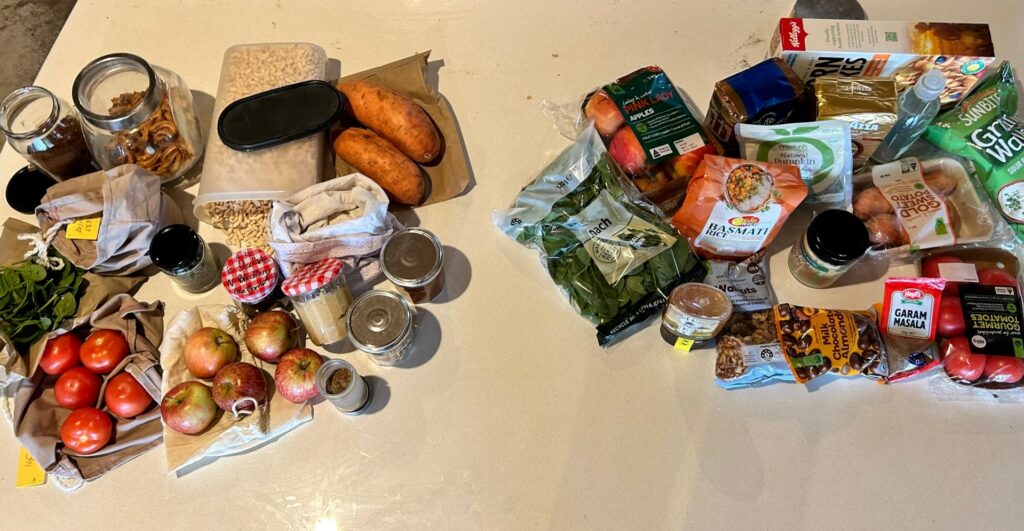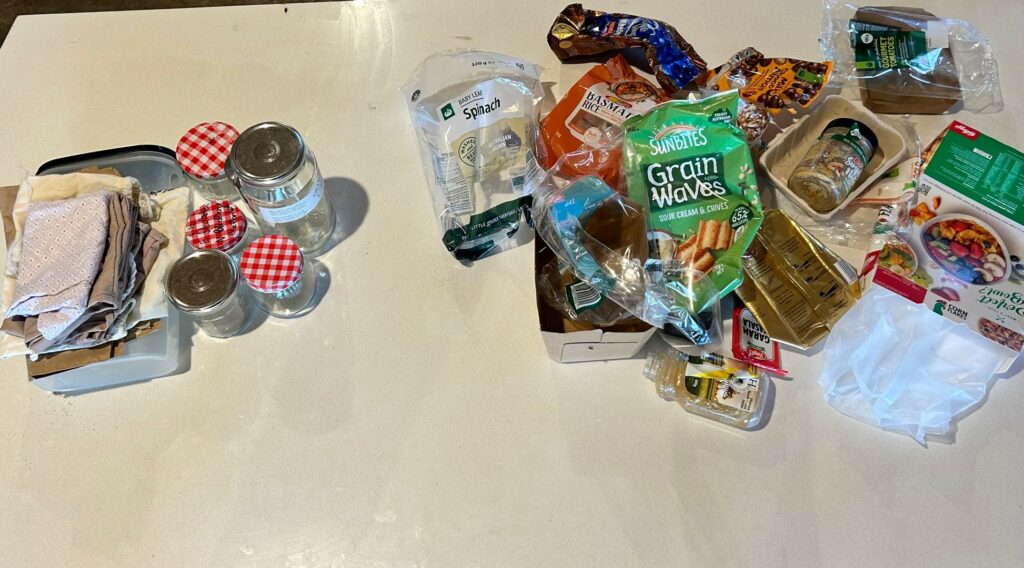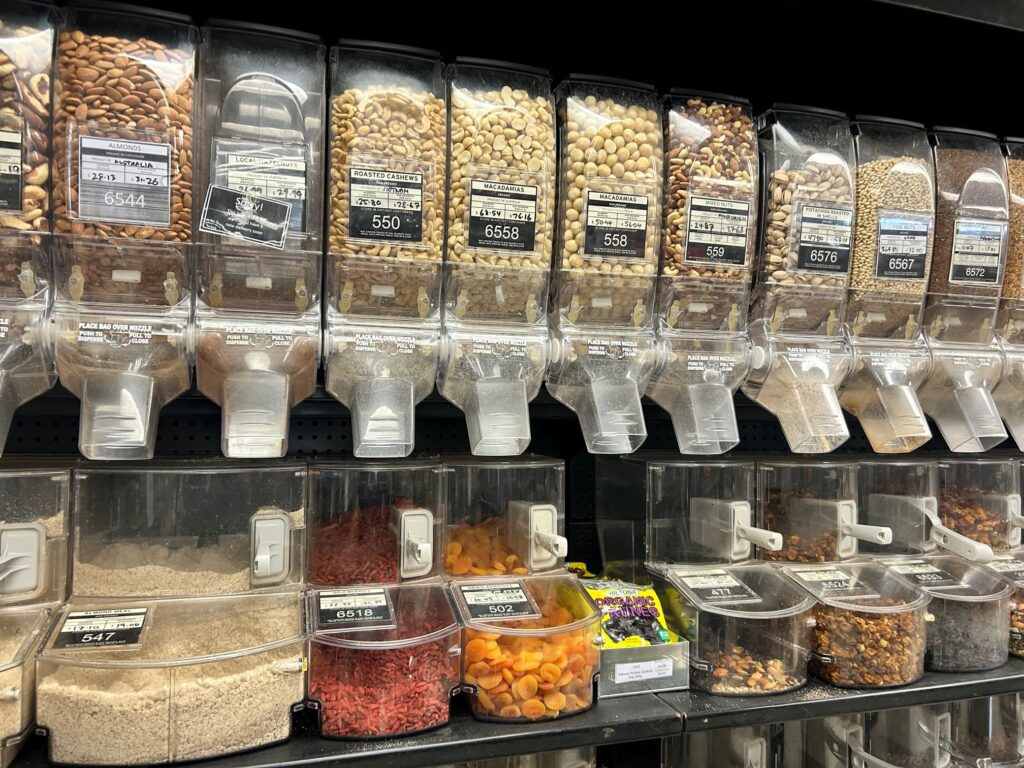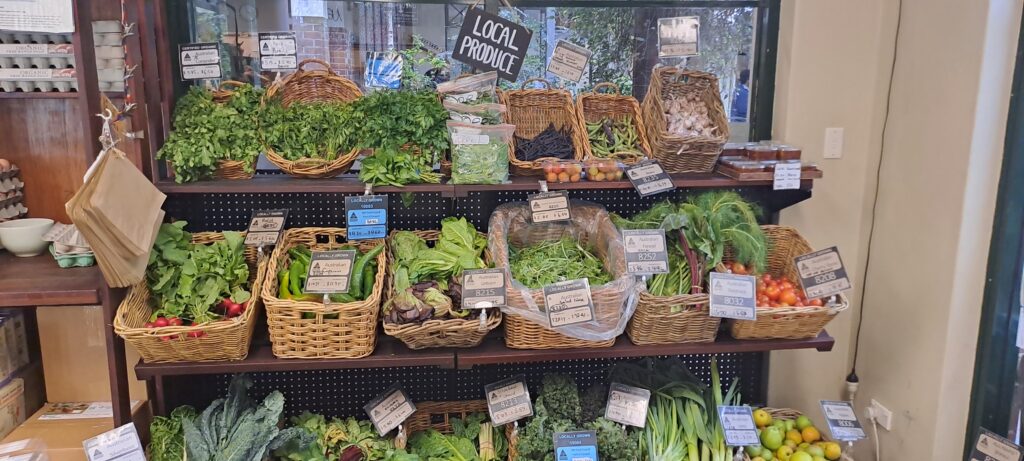Plastic-free shopping
Liz Durnan of Blue Mountains Planetary Health Initiative discovers it’s easy being green at the Co-op and shares some tips for shopping plastic-free.

The problem with packaging
Hands up if throwing out the rubbish is a frightening experience? Every week, I’m aghast at the mountain of packaging waste my relatively small family produces from everyday food and household items, with only a portion of it suitable for recycling.
It’s not as if I’m unaware of the spiralling problem of waste, especially plastic waste. Yet, each week I find myself tossing it into the garbage bin even while knowing an unacceptable amount will end up in oceans and waterways, causing havoc and threatening vulnerable species.
The World Wildlife Fund (WWF) estimates that a staggering eight million tonnes of plastic enter the world’s oceans each year. This waste kills sea mammals, turtles, countless fish and sea birds, and remains in our ecosystem for years.
My compulsion to reduce plastic waste has become more pressing since the recent collapse of soft plastic recycling at the supermarkets, with no immediate solution in sight.
It sometimes feels impossible to avoid excess packaging when buying food and snacks. But I wondered if I could slash my packaging waste by changing my shopping habits.
The experiment
With this in mind, I shopped for a basket of basic goods at a large supermarket. Then, armed with a cardboard box, some pre-used clean jars, cotton bags, and brown paper bags, I set out to match this shop at the Blue Mountains Food Co-op, taking photos of each shopping sample before and after use.
I chose a sample of comparable products available at both:
- Raw honey
- Peanut butter (You blend it yourself at the Co-op with fresh peanuts or almonds and you can choose from smooth, medium and crunchy.)
- Chips (Yes, the Co-op sells chips – not the endless array of choice offered by the supermarket but you can bulk-buy soy chips, corn chips and rice crackers.)
- Spice blend
- Apples
- Sweet potatoes
- Tomatoes
- Cereal (the Co-op has a range of whole grain cereals including oats, puffed millet, rice and spelt)
- Ground coffee
- Chocolate-coated almonds
- Cake flour
- Pumpkin (pepita) seeds
- Walnuts
- Baby spinach

My shop at the Co-op on the left, and supermarket on the right (Liz Durnan)
The results?
I was already convinced the supermarket shop would result in more waste, but I was still pretty shocked by just how much there was, after only a small shop. The results in the photos speak for themselves.

Packaging left over after the shop: Co-op on left, and supermarket on the right (Liz Durnan)
This is based on one small basket. Imagine a trolley-load of this multiplied by 52 weeks, from homes all over the Blue Mountains, all over Australia …
Is it expensive?
With inflation going gangbusters, I’m naturally concerned with finding the best prices. Supermarkets can offer specials because they have big spending power, but when I compared my sample shops, I was pleasantly surprised that many items were similarly priced. In many cases, the Co-op items were more competitively priced.
It’s worth noting that supermarkets reward us when we buy more of a product. For example, a one-kilo bag of walnuts will cost less per kg at the supermarket than if you buy a 250-gram bag. If you’re tempted to save by buying the bigger bag, they may go off before you get through them, especially if you live alone or don’t eat many walnuts, generating waste of a different kind.
At the Co-op you can buy as little as you need and the per-kilogram price remains the same.
Even more appealing, for the same price, or in some cases even cheaper, the Co-op offers an organic or local product. For example, the 400g squeezy tube of honey from the NSW south coast at the supermarket was the same price as the Co-op member price* for its honey, which was sourced in the Blue Mountains and Central West regions.
In fairness, it was heartening to see that the big supermarkets are taking steps with recyclable packaging of fruit and veg. It’s worth remembering that you can take your own bags to the supermarket for the fresh fruit and veg options that are available to buy loose.

Buying in bulk is cheaper and packaging free
Is it hard work?
I’ve heard that some people find shopping at a food co-op intimidating.
Sure, there’s a little more planning required for the do-it-yourself packing, but it’s rewarding. The tantalising aroma of fresh nuts while you blend them yourself or the satisfaction of filling a jar of local gooey honey offers a more tactile shopping experience.
It feels far from austere. There’s a sense of abundance in this compact shop, with ample rows of nuts and seeds, colourful spices and fresh organic produce. There is also a bountiful selection of fruit and veg from local growers and from the Co-op’s own little market garden, just a few hundred metres up the road.

Locally grown produce which couldn’t be fresher! (Harry Afentoglou)
If you’re not sure how it all works, see the guide below for tips. Once you get used to shopping like this, it’s not hard. It might take a little bit more time, but that’s likely to be offset by shorter queues at the checkout. I’m thankful there are no self-service checkouts here.
Become part of a community
Another big plus of shopping at the Co-op is that you’re supporting a not-for-profit store that is community-owned by approximately 2,500 members. The Co-op donates 10 percent of annual surplus profit to local environmental, food security, and social justice charities.
Everyone is welcome to shop at the Co-op – you don’t need to be a member – but if you do join, you get 10 percent off all your purchases. You can even have a say in how the Co-op is run.
Volunteering at the Co-op is a great way to get to know the shop and how it works, plus you’ll receive an extra 20 percent discount on purchases. For more information on volunteering see https://bmfoodcoop.org.au/about/volunteers/
Tips for shopping at the Co-op
The Co-op provides pre-used jars, as well as used egg cartons for free-range local eggs to make your shopping easier! (Harry Afentoglou)
- Get into the habit of collecting your old jam and condiment jars (in different sizes). Clean them and take them with you to purchase honey, peanut butter, nuts and seeds.
- If you’d rather not save jars, or don’t have the space to store them, you can buy new glass jars at the Co-op or they keep a selection of clean, pre-used jars you can use for free, as well as used egg cartons (for free-range local eggs).
- For larger purchases, such as flour and dried pulses, keep large bags or purchase cotton bags with tags or brown paper bags at the Co-op.
- When using your own jar, weigh it first at the Co-op and write the weight on the jar so this can be deducted from the final sale price at the checkout.
- Each product has a code. After you’ve filled your bag or jar, write the code on it for the checkout.
- If you’re unsure, the helpful Co-op staff are on hand to explain how it all works and can show you around when the shop is quiet.
- Across the lane from the Co-op is their Big Little Shop where you can stock up on non-food household items in bulk with your own packaging. Items include body wash, shampoo, epsom salts, dishwashing and laundry liquid, most of which are much cheaper than similar bottled products at the supermarket. It’s also a great place to buy sustainably pre-packaged gifts, cosmetics and toiletries.
By Liz Durnan


